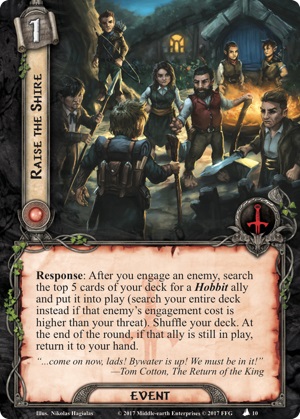Card search effects live and die on three factors - how easy it is to play, how likely it is to find a card it's searching for, and how effective the card we find is going to be. So let's have a look at why Raise the Shire is so good for the Hobbit archetype.
Costing only a single resource, and requiring you to engage an enemy makes it very easy to play. Engaging enemies, especially enemies with higher engagement cost than your threat, is what the Hobbit archetype is all about. And while there are only two Tactics Hobbit heroes (Merry and Tom), they both fill unique spots in the archetype that make them quite popular in both the classic Black Riders lineup (Sam, Merry, Pippin) and the usual Bond lineup (Sam, SpMerry, Pippin, Tom).
How likely it is to find an eligible Hobbit ally within the first 5 cards really depends on the build. But the kicker, where if the enemy engaged is above your threat, is the real power of this card. Being able to search your whole deck for the right Hobbit ally for the situation is incredibly powerful, makes it incredibly difficult to fail to find an ally to play with it unless somehow you've already drawn all of your allies before drawing into this card. And engaging enemies with a higher engagement cost that your threat is what the Hobbit archetype is all about, so it's playing into what you should already be trying to do anyway.
And how good are the allies you can get with this card? Well, as much as Hobbits have generally good allies anyway, I've found there are really only two that I look for consistently with Raise the Shire - Rosie and Gaffer Gamgee. Rosie provides such versatility to the Hobbit archetype that having in play will shore up any weakness you have to the current quest and allow you to build a proper board state. Gaffer is Feint on a stick, and while you may not need or be able to afford him every turn, being able to dodge the boss enemy attack for a turn can be enough to ensure you can kill it quicker as well.
The ally comes back into your hand at the end of the round; you only get it for one round without having to pay for it normally. But it means the turn it gets used you can use Gaffer's effect with impunity because you were going to have to pay for him anyway. The other thing this enables is picking an ally with an enters play effect - eg Bilbo or Odo Proudfoot - let's you double down on it, and potentially get two pipes or events for your trouble. If you already have the ally you want for your strategy, grabbing a generally useful ally such as Bywater Shirriff or Hobbit Archer never feels wasteful.
So for a single resource, it can be a Feint, or grab an extra blocker if you need it, or make sure that you get that key combo piece you need sooner rather than later. The versatility of the Hobbit allies means Raise the Shire is never going to be a dead card in your hand, and can also serve as extra copies of key allies to help thin your deck and then be used for different allies later on.
The one thing to watch out for with this card is the ally you put into play cannot come from your hand, so if you've already drawn the single copy of whichever ally you want they can't be put into play by this effect. So when engaging an enemy, play Raise the Shire before triggering Pippin's response to ensure you don't accidentally draw the card you want to put into play.
Some other notable interactions - the response is not restricted to the encounter phase, so it can be triggered by a Dúnedain Hunter or Wait no Longer and the ally brought in can be used for questing. Halbarad's effect kicks in the moment they are engaged, so you would get the benefit of the extra engagement cost while playing Raise the Shire. It's also worth pointing out you don't need a Hobbit hero to play it, so you could take in a different archetype as well - say a Gandalf deck trying to get value from Bilbo.
